Hofstede Model Analysis: Comparing UK and Morocco Cultures
VerifiedAdded on 2021/04/21
|9
|1768
|75
Report
AI Summary
This report delves into a comparative analysis of the cultures of the United Kingdom and Morocco, employing Geert Hofstede's cultural dimensions theory as its primary framework. The report examines key dimensions such as power distance, individualism, masculinity, uncertainty avoidance, long-term orientation, and indulgence, offering insights into how these dimensions manifest in both societies. Morocco is depicted as a hierarchical and collectivist society with a high preference for uncertainty avoidance and a normative approach, while the UK is characterized by low power distance, high individualism, and a preference for less structured situations, with an intermediate long-term orientation and high indulgence. The report concludes by emphasizing the importance of understanding these cultural differences for international organizations, highlighting how the Hofstede model can inform strategies for marketing and fostering positive work environments.
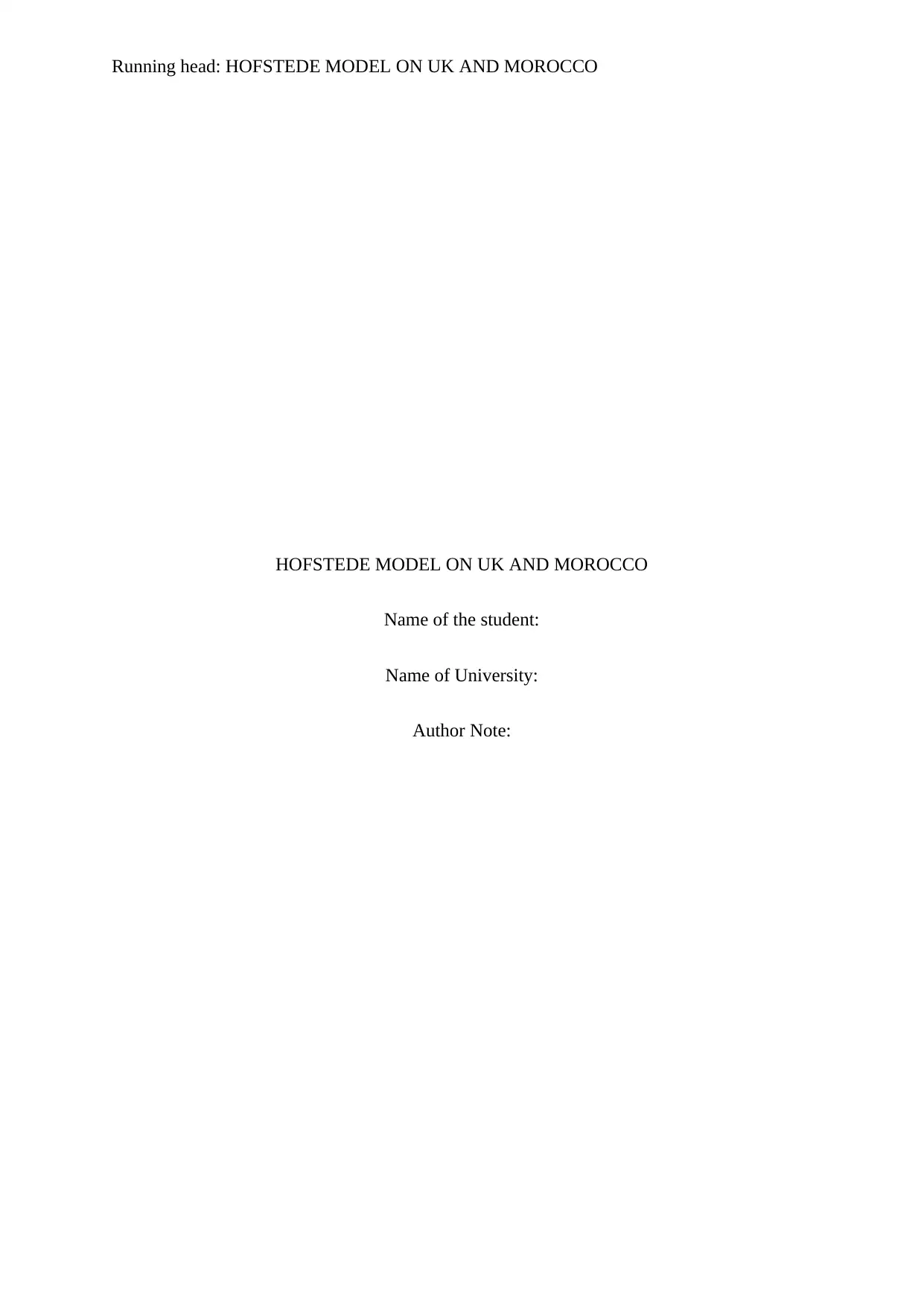
Running head: HOFSTEDE MODEL ON UK AND MOROCCO
HOFSTEDE MODEL ON UK AND MOROCCO
Name of the student:
Name of University:
Author Note:
HOFSTEDE MODEL ON UK AND MOROCCO
Name of the student:
Name of University:
Author Note:
Paraphrase This Document
Need a fresh take? Get an instant paraphrase of this document with our AI Paraphraser
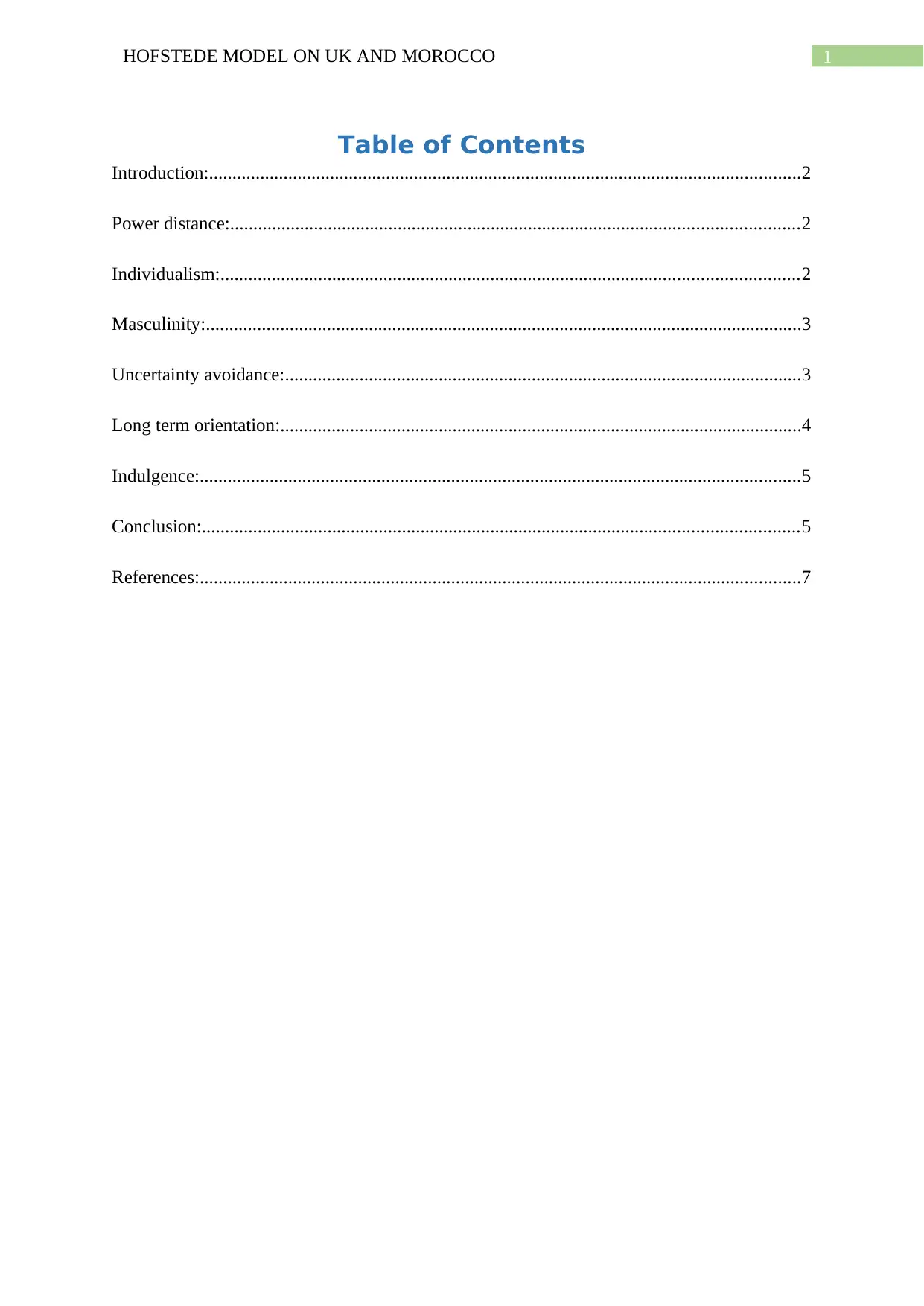
1HOFSTEDE MODEL ON UK AND MOROCCO
Table of Contents
Introduction:...............................................................................................................................2
Power distance:..........................................................................................................................2
Individualism:............................................................................................................................2
Masculinity:................................................................................................................................3
Uncertainty avoidance:...............................................................................................................3
Long term orientation:................................................................................................................4
Indulgence:.................................................................................................................................5
Conclusion:................................................................................................................................5
References:.................................................................................................................................7
Table of Contents
Introduction:...............................................................................................................................2
Power distance:..........................................................................................................................2
Individualism:............................................................................................................................2
Masculinity:................................................................................................................................3
Uncertainty avoidance:...............................................................................................................3
Long term orientation:................................................................................................................4
Indulgence:.................................................................................................................................5
Conclusion:................................................................................................................................5
References:.................................................................................................................................7
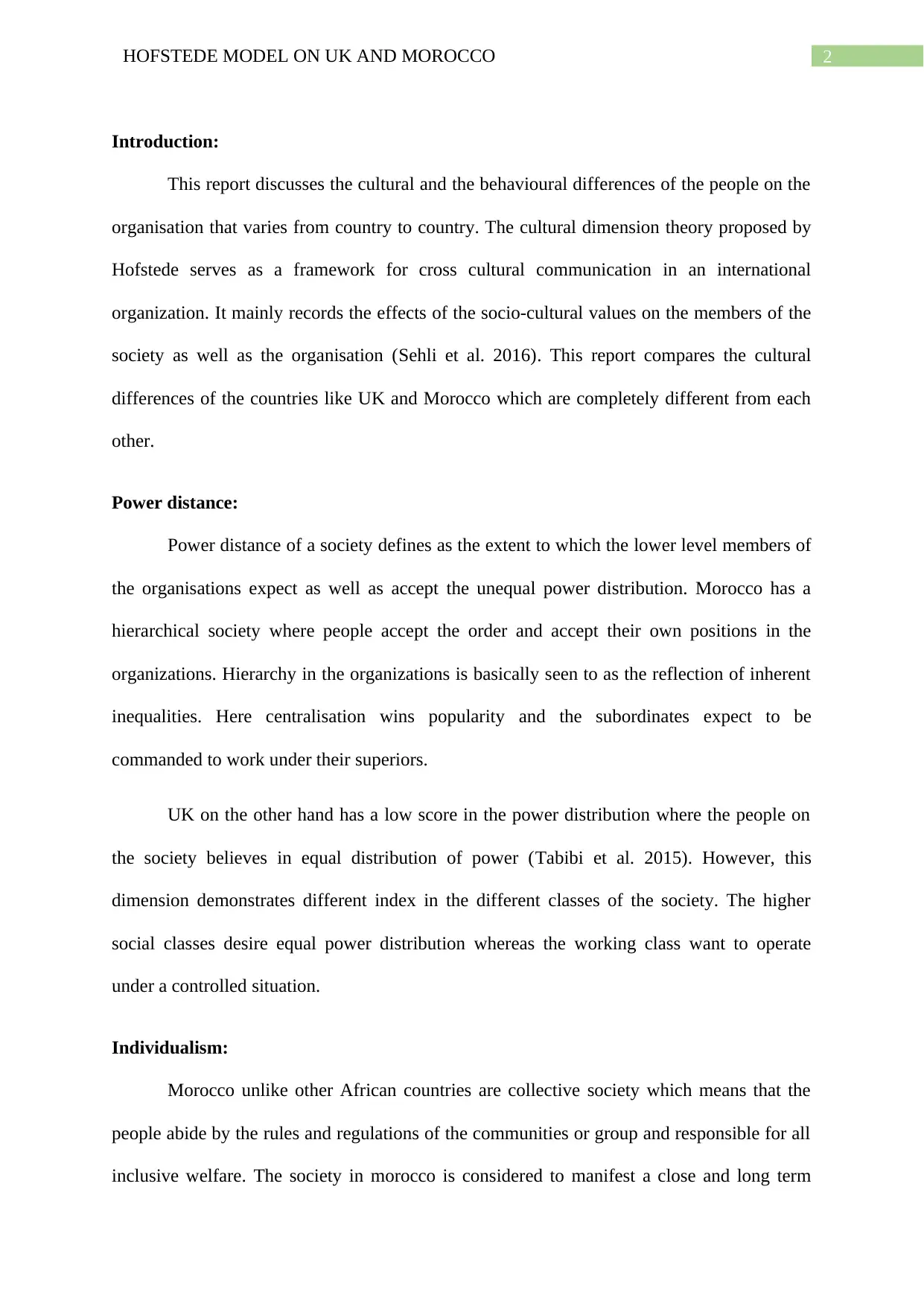
2HOFSTEDE MODEL ON UK AND MOROCCO
Introduction:
This report discusses the cultural and the behavioural differences of the people on the
organisation that varies from country to country. The cultural dimension theory proposed by
Hofstede serves as a framework for cross cultural communication in an international
organization. It mainly records the effects of the socio-cultural values on the members of the
society as well as the organisation (Sehli et al. 2016). This report compares the cultural
differences of the countries like UK and Morocco which are completely different from each
other.
Power distance:
Power distance of a society defines as the extent to which the lower level members of
the organisations expect as well as accept the unequal power distribution. Morocco has a
hierarchical society where people accept the order and accept their own positions in the
organizations. Hierarchy in the organizations is basically seen to as the reflection of inherent
inequalities. Here centralisation wins popularity and the subordinates expect to be
commanded to work under their superiors.
UK on the other hand has a low score in the power distribution where the people on
the society believes in equal distribution of power (Tabibi et al. 2015). However, this
dimension demonstrates different index in the different classes of the society. The higher
social classes desire equal power distribution whereas the working class want to operate
under a controlled situation.
Individualism:
Morocco unlike other African countries are collective society which means that the
people abide by the rules and regulations of the communities or group and responsible for all
inclusive welfare. The society in morocco is considered to manifest a close and long term
Introduction:
This report discusses the cultural and the behavioural differences of the people on the
organisation that varies from country to country. The cultural dimension theory proposed by
Hofstede serves as a framework for cross cultural communication in an international
organization. It mainly records the effects of the socio-cultural values on the members of the
society as well as the organisation (Sehli et al. 2016). This report compares the cultural
differences of the countries like UK and Morocco which are completely different from each
other.
Power distance:
Power distance of a society defines as the extent to which the lower level members of
the organisations expect as well as accept the unequal power distribution. Morocco has a
hierarchical society where people accept the order and accept their own positions in the
organizations. Hierarchy in the organizations is basically seen to as the reflection of inherent
inequalities. Here centralisation wins popularity and the subordinates expect to be
commanded to work under their superiors.
UK on the other hand has a low score in the power distribution where the people on
the society believes in equal distribution of power (Tabibi et al. 2015). However, this
dimension demonstrates different index in the different classes of the society. The higher
social classes desire equal power distribution whereas the working class want to operate
under a controlled situation.
Individualism:
Morocco unlike other African countries are collective society which means that the
people abide by the rules and regulations of the communities or group and responsible for all
inclusive welfare. The society in morocco is considered to manifest a close and long term
⊘ This is a preview!⊘
Do you want full access?
Subscribe today to unlock all pages.

Trusted by 1+ million students worldwide
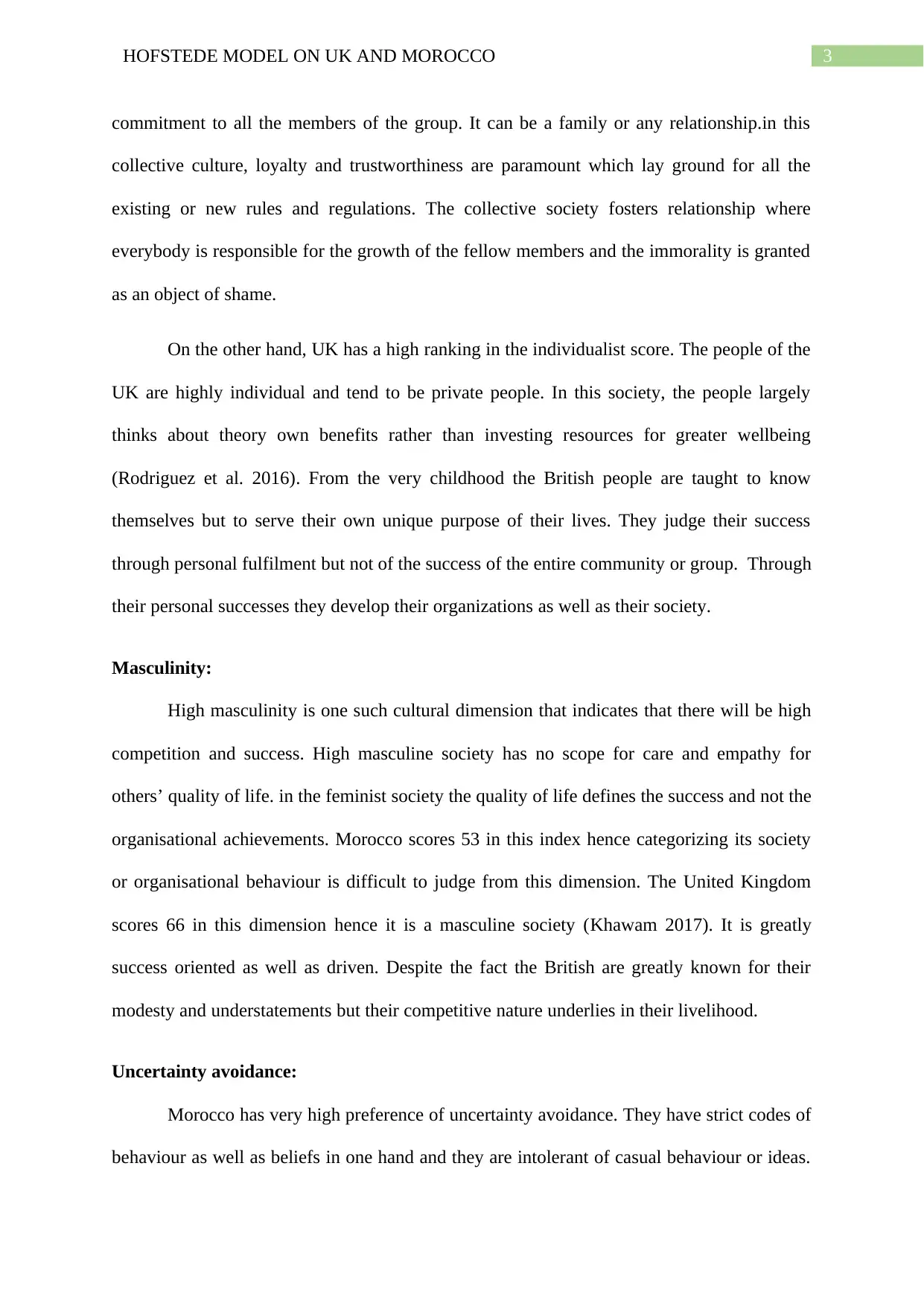
3HOFSTEDE MODEL ON UK AND MOROCCO
commitment to all the members of the group. It can be a family or any relationship.in this
collective culture, loyalty and trustworthiness are paramount which lay ground for all the
existing or new rules and regulations. The collective society fosters relationship where
everybody is responsible for the growth of the fellow members and the immorality is granted
as an object of shame.
On the other hand, UK has a high ranking in the individualist score. The people of the
UK are highly individual and tend to be private people. In this society, the people largely
thinks about theory own benefits rather than investing resources for greater wellbeing
(Rodriguez et al. 2016). From the very childhood the British people are taught to know
themselves but to serve their own unique purpose of their lives. They judge their success
through personal fulfilment but not of the success of the entire community or group. Through
their personal successes they develop their organizations as well as their society.
Masculinity:
High masculinity is one such cultural dimension that indicates that there will be high
competition and success. High masculine society has no scope for care and empathy for
others’ quality of life. in the feminist society the quality of life defines the success and not the
organisational achievements. Morocco scores 53 in this index hence categorizing its society
or organisational behaviour is difficult to judge from this dimension. The United Kingdom
scores 66 in this dimension hence it is a masculine society (Khawam 2017). It is greatly
success oriented as well as driven. Despite the fact the British are greatly known for their
modesty and understatements but their competitive nature underlies in their livelihood.
Uncertainty avoidance:
Morocco has very high preference of uncertainty avoidance. They have strict codes of
behaviour as well as beliefs in one hand and they are intolerant of casual behaviour or ideas.
commitment to all the members of the group. It can be a family or any relationship.in this
collective culture, loyalty and trustworthiness are paramount which lay ground for all the
existing or new rules and regulations. The collective society fosters relationship where
everybody is responsible for the growth of the fellow members and the immorality is granted
as an object of shame.
On the other hand, UK has a high ranking in the individualist score. The people of the
UK are highly individual and tend to be private people. In this society, the people largely
thinks about theory own benefits rather than investing resources for greater wellbeing
(Rodriguez et al. 2016). From the very childhood the British people are taught to know
themselves but to serve their own unique purpose of their lives. They judge their success
through personal fulfilment but not of the success of the entire community or group. Through
their personal successes they develop their organizations as well as their society.
Masculinity:
High masculinity is one such cultural dimension that indicates that there will be high
competition and success. High masculine society has no scope for care and empathy for
others’ quality of life. in the feminist society the quality of life defines the success and not the
organisational achievements. Morocco scores 53 in this index hence categorizing its society
or organisational behaviour is difficult to judge from this dimension. The United Kingdom
scores 66 in this dimension hence it is a masculine society (Khawam 2017). It is greatly
success oriented as well as driven. Despite the fact the British are greatly known for their
modesty and understatements but their competitive nature underlies in their livelihood.
Uncertainty avoidance:
Morocco has very high preference of uncertainty avoidance. They have strict codes of
behaviour as well as beliefs in one hand and they are intolerant of casual behaviour or ideas.
Paraphrase This Document
Need a fresh take? Get an instant paraphrase of this document with our AI Paraphraser
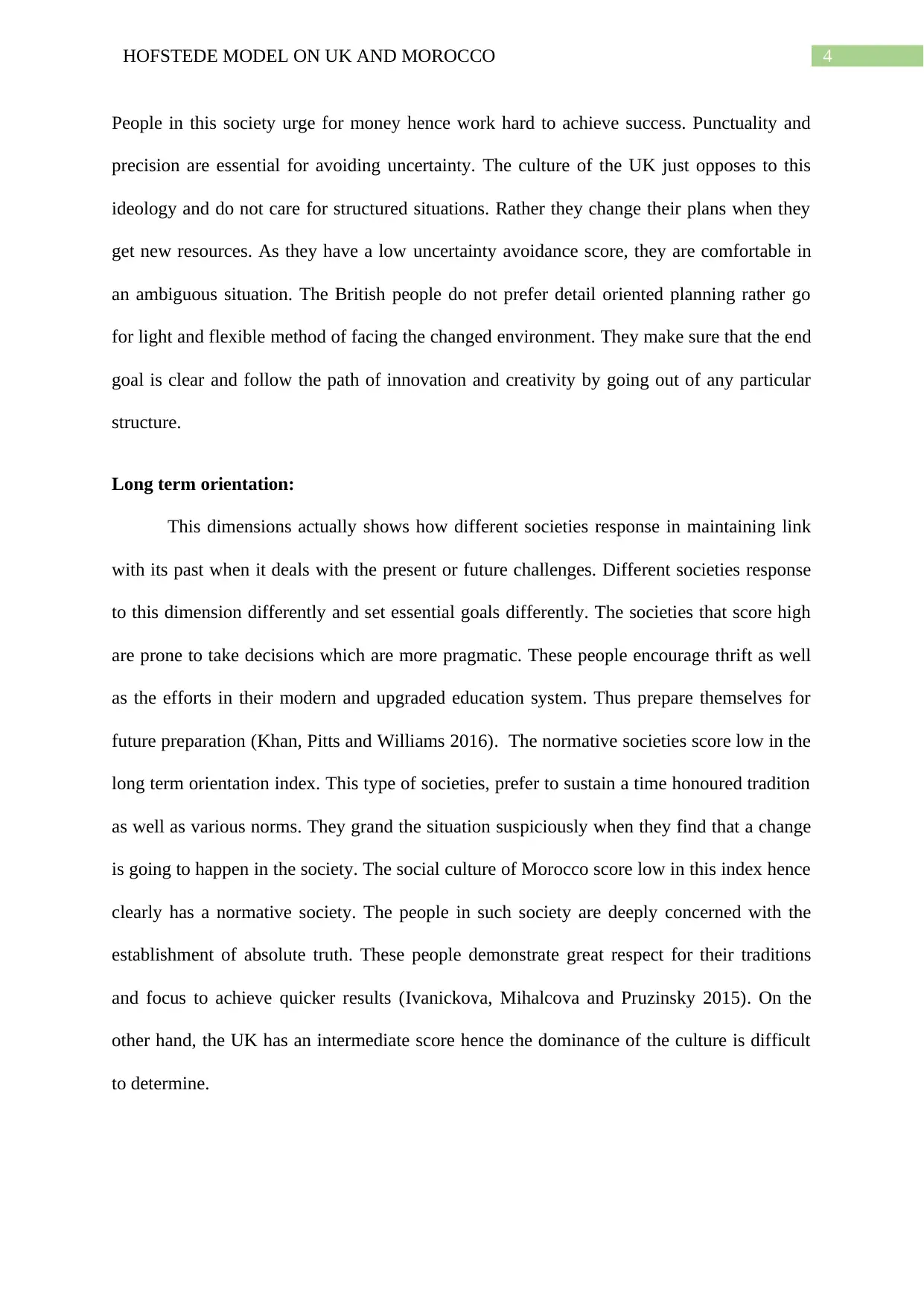
4HOFSTEDE MODEL ON UK AND MOROCCO
People in this society urge for money hence work hard to achieve success. Punctuality and
precision are essential for avoiding uncertainty. The culture of the UK just opposes to this
ideology and do not care for structured situations. Rather they change their plans when they
get new resources. As they have a low uncertainty avoidance score, they are comfortable in
an ambiguous situation. The British people do not prefer detail oriented planning rather go
for light and flexible method of facing the changed environment. They make sure that the end
goal is clear and follow the path of innovation and creativity by going out of any particular
structure.
Long term orientation:
This dimensions actually shows how different societies response in maintaining link
with its past when it deals with the present or future challenges. Different societies response
to this dimension differently and set essential goals differently. The societies that score high
are prone to take decisions which are more pragmatic. These people encourage thrift as well
as the efforts in their modern and upgraded education system. Thus prepare themselves for
future preparation (Khan, Pitts and Williams 2016). The normative societies score low in the
long term orientation index. This type of societies, prefer to sustain a time honoured tradition
as well as various norms. They grand the situation suspiciously when they find that a change
is going to happen in the society. The social culture of Morocco score low in this index hence
clearly has a normative society. The people in such society are deeply concerned with the
establishment of absolute truth. These people demonstrate great respect for their traditions
and focus to achieve quicker results (Ivanickova, Mihalcova and Pruzinsky 2015). On the
other hand, the UK has an intermediate score hence the dominance of the culture is difficult
to determine.
People in this society urge for money hence work hard to achieve success. Punctuality and
precision are essential for avoiding uncertainty. The culture of the UK just opposes to this
ideology and do not care for structured situations. Rather they change their plans when they
get new resources. As they have a low uncertainty avoidance score, they are comfortable in
an ambiguous situation. The British people do not prefer detail oriented planning rather go
for light and flexible method of facing the changed environment. They make sure that the end
goal is clear and follow the path of innovation and creativity by going out of any particular
structure.
Long term orientation:
This dimensions actually shows how different societies response in maintaining link
with its past when it deals with the present or future challenges. Different societies response
to this dimension differently and set essential goals differently. The societies that score high
are prone to take decisions which are more pragmatic. These people encourage thrift as well
as the efforts in their modern and upgraded education system. Thus prepare themselves for
future preparation (Khan, Pitts and Williams 2016). The normative societies score low in the
long term orientation index. This type of societies, prefer to sustain a time honoured tradition
as well as various norms. They grand the situation suspiciously when they find that a change
is going to happen in the society. The social culture of Morocco score low in this index hence
clearly has a normative society. The people in such society are deeply concerned with the
establishment of absolute truth. These people demonstrate great respect for their traditions
and focus to achieve quicker results (Ivanickova, Mihalcova and Pruzinsky 2015). On the
other hand, the UK has an intermediate score hence the dominance of the culture is difficult
to determine.
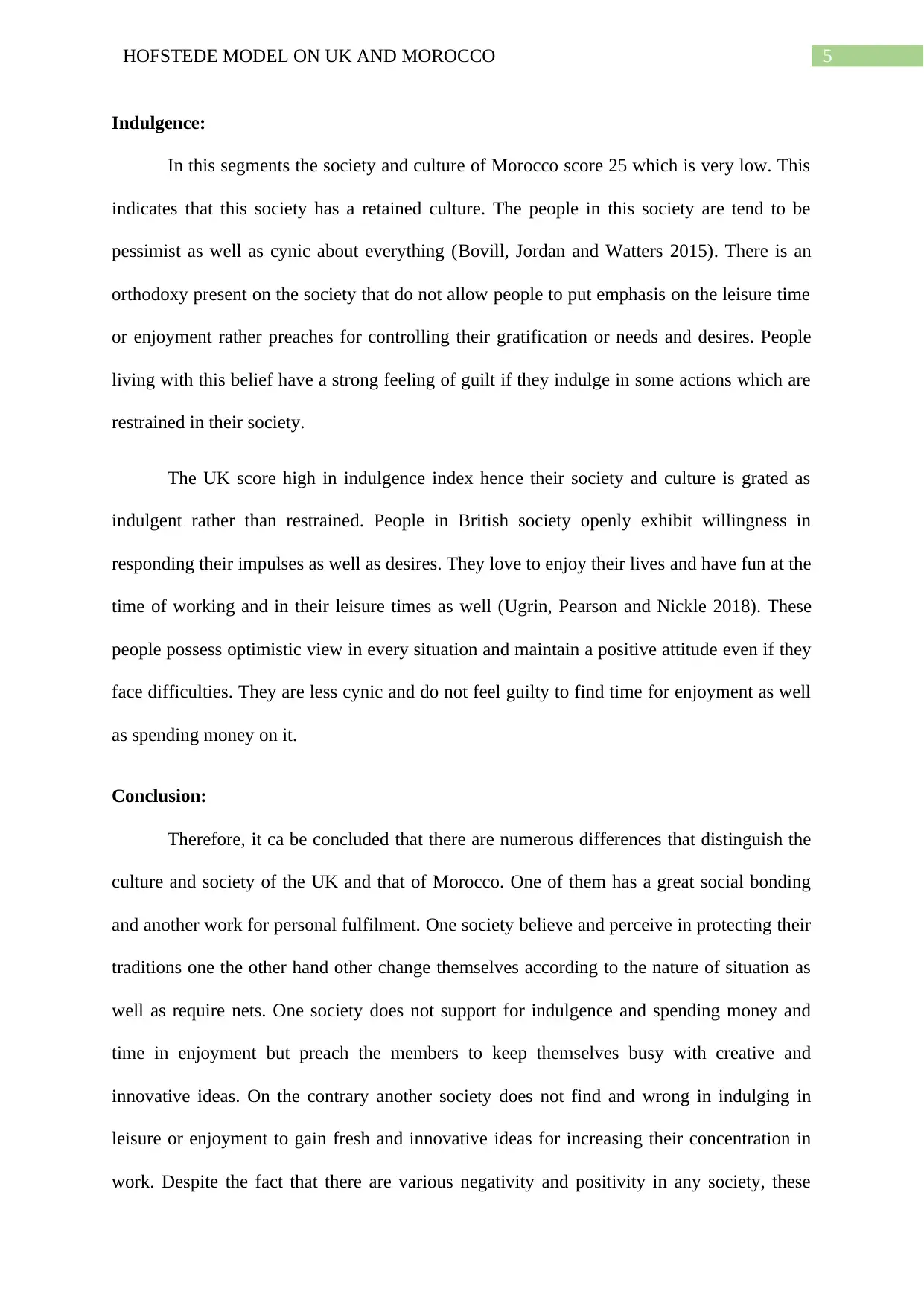
5HOFSTEDE MODEL ON UK AND MOROCCO
Indulgence:
In this segments the society and culture of Morocco score 25 which is very low. This
indicates that this society has a retained culture. The people in this society are tend to be
pessimist as well as cynic about everything (Bovill, Jordan and Watters 2015). There is an
orthodoxy present on the society that do not allow people to put emphasis on the leisure time
or enjoyment rather preaches for controlling their gratification or needs and desires. People
living with this belief have a strong feeling of guilt if they indulge in some actions which are
restrained in their society.
The UK score high in indulgence index hence their society and culture is grated as
indulgent rather than restrained. People in British society openly exhibit willingness in
responding their impulses as well as desires. They love to enjoy their lives and have fun at the
time of working and in their leisure times as well (Ugrin, Pearson and Nickle 2018). These
people possess optimistic view in every situation and maintain a positive attitude even if they
face difficulties. They are less cynic and do not feel guilty to find time for enjoyment as well
as spending money on it.
Conclusion:
Therefore, it ca be concluded that there are numerous differences that distinguish the
culture and society of the UK and that of Morocco. One of them has a great social bonding
and another work for personal fulfilment. One society believe and perceive in protecting their
traditions one the other hand other change themselves according to the nature of situation as
well as require nets. One society does not support for indulgence and spending money and
time in enjoyment but preach the members to keep themselves busy with creative and
innovative ideas. On the contrary another society does not find and wrong in indulging in
leisure or enjoyment to gain fresh and innovative ideas for increasing their concentration in
work. Despite the fact that there are various negativity and positivity in any society, these
Indulgence:
In this segments the society and culture of Morocco score 25 which is very low. This
indicates that this society has a retained culture. The people in this society are tend to be
pessimist as well as cynic about everything (Bovill, Jordan and Watters 2015). There is an
orthodoxy present on the society that do not allow people to put emphasis on the leisure time
or enjoyment rather preaches for controlling their gratification or needs and desires. People
living with this belief have a strong feeling of guilt if they indulge in some actions which are
restrained in their society.
The UK score high in indulgence index hence their society and culture is grated as
indulgent rather than restrained. People in British society openly exhibit willingness in
responding their impulses as well as desires. They love to enjoy their lives and have fun at the
time of working and in their leisure times as well (Ugrin, Pearson and Nickle 2018). These
people possess optimistic view in every situation and maintain a positive attitude even if they
face difficulties. They are less cynic and do not feel guilty to find time for enjoyment as well
as spending money on it.
Conclusion:
Therefore, it ca be concluded that there are numerous differences that distinguish the
culture and society of the UK and that of Morocco. One of them has a great social bonding
and another work for personal fulfilment. One society believe and perceive in protecting their
traditions one the other hand other change themselves according to the nature of situation as
well as require nets. One society does not support for indulgence and spending money and
time in enjoyment but preach the members to keep themselves busy with creative and
innovative ideas. On the contrary another society does not find and wrong in indulging in
leisure or enjoyment to gain fresh and innovative ideas for increasing their concentration in
work. Despite the fact that there are various negativity and positivity in any society, these
⊘ This is a preview!⊘
Do you want full access?
Subscribe today to unlock all pages.

Trusted by 1+ million students worldwide

6HOFSTEDE MODEL ON UK AND MOROCCO
cultural dimension presented by Hofstede help the organizations that work in the international
markets, to get implicit ideas to lay their strategies for marketing as well as maintaining
positive work culture within the organisation.
cultural dimension presented by Hofstede help the organizations that work in the international
markets, to get implicit ideas to lay their strategies for marketing as well as maintaining
positive work culture within the organisation.
Paraphrase This Document
Need a fresh take? Get an instant paraphrase of this document with our AI Paraphraser
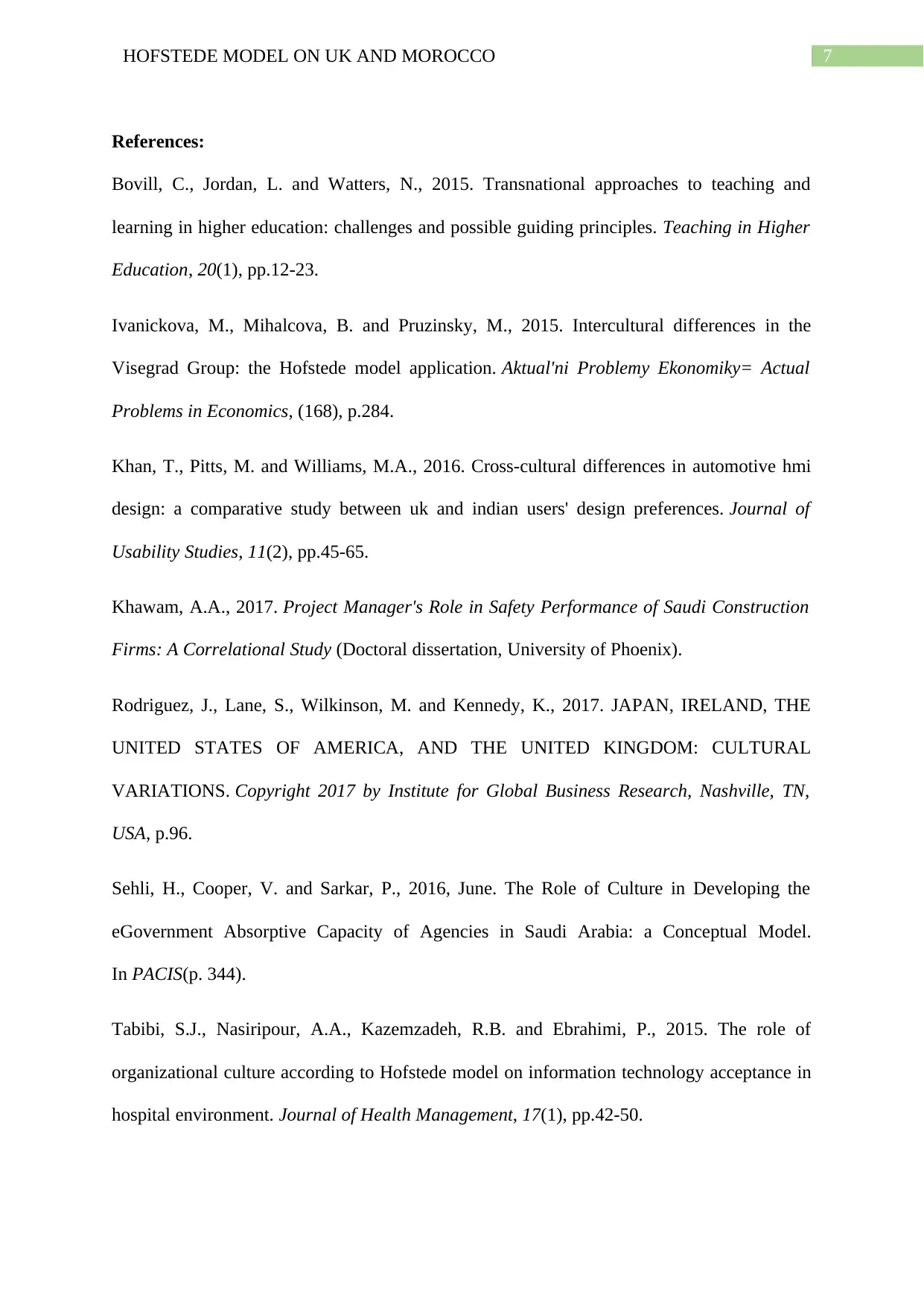
7HOFSTEDE MODEL ON UK AND MOROCCO
References:
Bovill, C., Jordan, L. and Watters, N., 2015. Transnational approaches to teaching and
learning in higher education: challenges and possible guiding principles. Teaching in Higher
Education, 20(1), pp.12-23.
Ivanickova, M., Mihalcova, B. and Pruzinsky, M., 2015. Intercultural differences in the
Visegrad Group: the Hofstede model application. Aktual'ni Problemy Ekonomiky= Actual
Problems in Economics, (168), p.284.
Khan, T., Pitts, M. and Williams, M.A., 2016. Cross-cultural differences in automotive hmi
design: a comparative study between uk and indian users' design preferences. Journal of
Usability Studies, 11(2), pp.45-65.
Khawam, A.A., 2017. Project Manager's Role in Safety Performance of Saudi Construction
Firms: A Correlational Study (Doctoral dissertation, University of Phoenix).
Rodriguez, J., Lane, S., Wilkinson, M. and Kennedy, K., 2017. JAPAN, IRELAND, THE
UNITED STATES OF AMERICA, AND THE UNITED KINGDOM: CULTURAL
VARIATIONS. Copyright 2017 by Institute for Global Business Research, Nashville, TN,
USA, p.96.
Sehli, H., Cooper, V. and Sarkar, P., 2016, June. The Role of Culture in Developing the
eGovernment Absorptive Capacity of Agencies in Saudi Arabia: a Conceptual Model.
In PACIS(p. 344).
Tabibi, S.J., Nasiripour, A.A., Kazemzadeh, R.B. and Ebrahimi, P., 2015. The role of
organizational culture according to Hofstede model on information technology acceptance in
hospital environment. Journal of Health Management, 17(1), pp.42-50.
References:
Bovill, C., Jordan, L. and Watters, N., 2015. Transnational approaches to teaching and
learning in higher education: challenges and possible guiding principles. Teaching in Higher
Education, 20(1), pp.12-23.
Ivanickova, M., Mihalcova, B. and Pruzinsky, M., 2015. Intercultural differences in the
Visegrad Group: the Hofstede model application. Aktual'ni Problemy Ekonomiky= Actual
Problems in Economics, (168), p.284.
Khan, T., Pitts, M. and Williams, M.A., 2016. Cross-cultural differences in automotive hmi
design: a comparative study between uk and indian users' design preferences. Journal of
Usability Studies, 11(2), pp.45-65.
Khawam, A.A., 2017. Project Manager's Role in Safety Performance of Saudi Construction
Firms: A Correlational Study (Doctoral dissertation, University of Phoenix).
Rodriguez, J., Lane, S., Wilkinson, M. and Kennedy, K., 2017. JAPAN, IRELAND, THE
UNITED STATES OF AMERICA, AND THE UNITED KINGDOM: CULTURAL
VARIATIONS. Copyright 2017 by Institute for Global Business Research, Nashville, TN,
USA, p.96.
Sehli, H., Cooper, V. and Sarkar, P., 2016, June. The Role of Culture in Developing the
eGovernment Absorptive Capacity of Agencies in Saudi Arabia: a Conceptual Model.
In PACIS(p. 344).
Tabibi, S.J., Nasiripour, A.A., Kazemzadeh, R.B. and Ebrahimi, P., 2015. The role of
organizational culture according to Hofstede model on information technology acceptance in
hospital environment. Journal of Health Management, 17(1), pp.42-50.
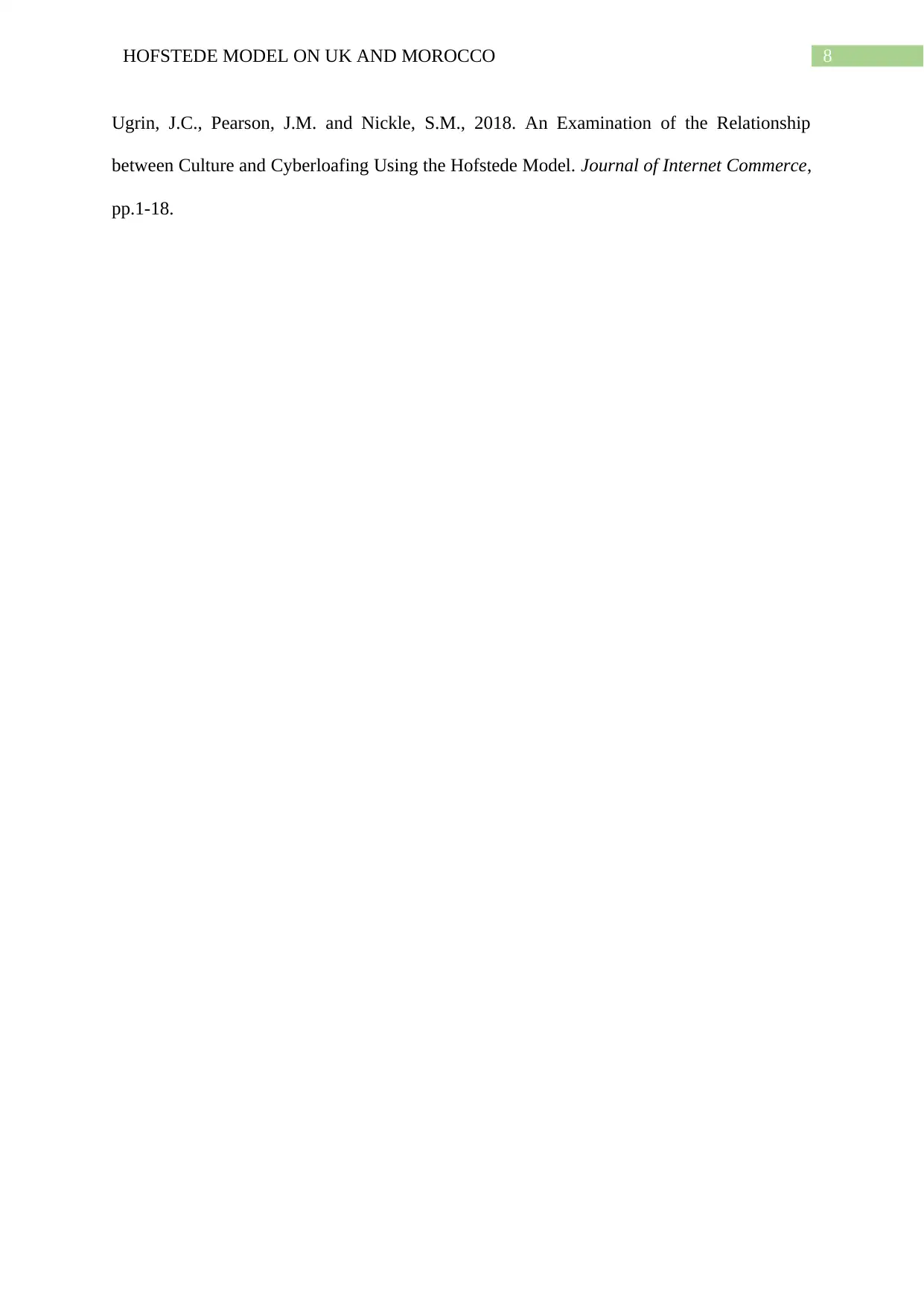
8HOFSTEDE MODEL ON UK AND MOROCCO
Ugrin, J.C., Pearson, J.M. and Nickle, S.M., 2018. An Examination of the Relationship
between Culture and Cyberloafing Using the Hofstede Model. Journal of Internet Commerce,
pp.1-18.
Ugrin, J.C., Pearson, J.M. and Nickle, S.M., 2018. An Examination of the Relationship
between Culture and Cyberloafing Using the Hofstede Model. Journal of Internet Commerce,
pp.1-18.
⊘ This is a preview!⊘
Do you want full access?
Subscribe today to unlock all pages.

Trusted by 1+ million students worldwide
1 out of 9
Related Documents
Your All-in-One AI-Powered Toolkit for Academic Success.
+13062052269
info@desklib.com
Available 24*7 on WhatsApp / Email
![[object Object]](/_next/static/media/star-bottom.7253800d.svg)
Unlock your academic potential
Copyright © 2020–2026 A2Z Services. All Rights Reserved. Developed and managed by ZUCOL.





